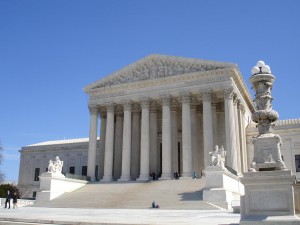By Kyle Roberts

In my constitution classes I always ask the participants to define a “right.” The catch is they have to do it without using the word “right.”
In my experience, whenever people are talking about rights, it is always in the context of a right to something: a right to life, to bear arms, to liberty, to property, to freely exercise my religion, etc.
This idea is inaccurate, not to mention that standard lexicography practice requires that a definition cannot include the word it intends to define.
Usually, the response I get from participants when trying to define a right without using the word is a mass of vocal segregates followed by an array of shots in the dark at what is obviously an unknown target.
Unfortunately this is more common than not. There is almost endless clamor and chatter in our society for protection of “our rights” — yet we don’t even know what a right is.
We know that our goals must be achievable, definable, and that we must be able to clearly articulate them to others.
If we are unable to do this with one of the most fundamental concepts of freedom, then how can we expect to fight for or attain what we desire?
What is a Right Anyway?
What, then, is a right? A right is simply the authorization to act. It is not the action.
If there is no right, then there can be no lawful action. A right is a filter for the actions of any lawful entity that can act.
As it concerns human beings, a right is a filter that guides our free will and agency.
Here is a simple example. The Constitution grants certain powers to the government. In the founding era, rights of the government and powers thereof were synonymous.
The powers granted give the government the right to act — or it grants them the authorization to act within certain limits.
This is where the tenth amendment becomes powerful:
“All powers [rights, or authorizations to act] not delegated to the government by the constitution, nor prohibited by it to the states, are reserved to the states respectively, or to the people.”
If the power, or right, is not granted, then there is no authorization to do it. That power, or right, or authorization to act is reserved to the original entity that had the power to delegate it.
In essence, man can act. We have the physical powers of action, or the physical powers to carry out our rights, our authorizations to act.
This begs the question: If a right is the authorization to act then where does the authorization come from?
As it concerns our fundamental rights,
“We hold these truths to be self-evident [not requiring proof] that all men are created equal, that they are endowed by their creator with certain unalienable rights, that among these are life, liberty, and the pursuit of happiness.”
Man is endowed by God with certain rights and all powers of action. Rights limit and define the proper sphere of action for men. Some of these rights endowed, or granted, upon men are unalienable.
What is Unalienable?
Next question: What does it mean for a right, or the authorization to act, to be unalienable?
Lets consult some founding-era dictionaries. I will cite one lay dictionary and one legal dictionary.
Noah Webster’s 1828 Dictionary. (I cite this as a founding era dictionary because Noah Webster was a prominent founder and had significant influence in the ratification debates.)
ALIEN, a [L. alienus, from alius, another, pronounced ˈāl-yən] (notice the meaning of the latin root)
- Foreign; not belonging to the same country, land or government
- Belonging to one who is not a citizen
- Estranged; foreign; not allied; adverse to
ALIEN, n.
- A foreigner; one born in, or belonging to, another country; one who is not a denizen, or entitled to the privileges of a citizen
- In scripture one who is a stranger to the church of Christ, or to the covenant of grace
These definitions deal specifically with the concept of a foreigner. They have nothing to do with the rights of men.
Here, from Webster’s, is the next set of definitions of a different word with the same spelling:
ALIEN, ALIENE v.t. [L. Alieno, to let go or transfer, pronounced ālē-ən] (notice the different meaning of the latin root)
- To transfer title or property to another; to sell
- To estrange; to withdraw, as the affections; to make indifferent or averse, where love or friendship before subsisted
UNALIENABLE, a.
- Not alienable; that cannot be alienated; that may not be transferred; as unalienable rights
UNALIENABLY, adv.
- In a manner that admits of no alienation; as property unalienably vested
UNALIENATED, a.
- Not alienated; not transferred; not estranged
The word Inalienable refers you to unalienable.
The difference in definition and latin root between the two words clearly identifies the true meaning of the word unalienable.
Notice in the first set of definitions the word unalienable was not applicable nor was it present. Only in the second set when dealing with property does it apply.
Our rights endowed upon us by God are not transferable. Neither can we transfer them nor have them transferred away from us. Any breach of this would violate God’s law.
 The next set of definitions comes from John Bouvier’s Law Dictionary: Adapted to The Constitution and Laws of The United States of America and of The Several States of The American Union.”
The next set of definitions comes from John Bouvier’s Law Dictionary: Adapted to The Constitution and Laws of The United States of America and of The Several States of The American Union.”
John Bouvier was a French immigrant in 1805. His study of American Jurisprudence led him to realize there was no law dictionary specifically written for American law. All other dictionaries of law were based in the English Common Law.
As a result he spent the next 20 years compiling his dictionary based on the American system of law as re-invented by the founding generation. He published it in 1839.
His dictionary also has two different definitions for the spelling a-l-i-e-n. Notice again the different latin roots and meanings.
ALIEN (Lat. alienus, foreign, strange)
- A foreigner; one of foreign birth
- An alien cannot acquire title to real estate by descent, or by other mere operation of law
ALIEN (Lat. alieno, to transfer)
- To convey; to transfer;
ALIENATION – of Estates
- The transfer of the property and possession of lands, tenements, or other things, from one person to another.
- Alienations by deed, by conveyances at common law…
UNALIENABLE
- Incapable of being transferred. (my emphasis)
Things which are not in commerce, as, public roads, are in their nature unalienable.
- Some things are unalienable in consequence of particular provision in the law forbidding their sale of transfer.
- The natural rights of life and liberty are unalienable. (my emphasis)
In this dictionary, as in Mr. Webster’s, there is only one entry for the word unalienable; they both place it under the heading of the root meaning to transfer.
The logical and sound conclusion we are brought to is that those certain rights we have, which are unalienable, cannot be transferred away from us.
In other words no other entity than each individual human being has been given the authorization to carry out those rights that are unalienable — or non-transferable. Any entity in violation of this rule is in direct violation of God’s law.
Let’s rewrite the phrase in the Declaration of Independence.
The original text is: We hold these Truths to be self-evident, that all men are created equal, that they are endowed by their creator with certain unalienable rights, that among these are life liberty, and the pursuit of happiness.
Here is the rewrite: We hold these Truths to be self-evident, that all men are created equal, that they have been granted by their creator certain non-transferable or conveyable authorizations to act, that among these are life, liberty, and the pursuit of happiness.
This is the biggest reason why true freedom is based in God. For without Him, all rights would be the product of human production. This translates into all rights would come from government.
When all rights come from government they are all alienable.
Summary
Essentially, there are four classes of rights – or authorizations to act.
First, those rights we have been endowed with by God. These are unalienable – or non-transferable.
Second, those rights we may call individual rights. These consist of all other rights we possess outside our unalienable rights. These are transferable as we see fit.
Third, the powers, or rights, of the government. These are those powers delegated by the people to the various government entities. Above I noted that the founders equated government powers with government rights.
Fourth, those rights created by the government and issued to the people. These are privileges and immunities granted by the government to the people. So-called human and civil rights fall in this category. The great constitutional example is the privilege of the writ of habeas corpus.
The word unalienable is not pronounced as is commonly heard: un – alien (as in the creatures in flying saucers) – able. Thus it has nothing to do with the legal concept of aliens, or foreigners, or our rights.
The true pronunciation is un – a lien – (as in a bank lien, or tax lien on a piece of property) – able. This legal term has direct reference to the non-transferability of property.
A right is the authorization to act. It is not the action. This applies to all contexts in which the word right is applied, including the four different classes of rights above. Rights guide our free will and agency. They are filters for our actions.
This is the whole context in which the Declaration of Independence is written. Jefferson basically said that we have certain non-transferrable rights most of which have been repeatedly violated by the King, and then he listed the violations.
It is vital to liberty that we are able to define and articulate what we are fighting for. Comprehending rights, especially those that are unalienable, and their origination are fundamental to this pursuit.
*******************************
 Kyle Roberts is a small business owner who has committed his life to the cause of freedom. He is dedicated to recreating strong local self-government in his community by creating, and helping others create, institutions that create and preserve freedom.
Kyle Roberts is a small business owner who has committed his life to the cause of freedom. He is dedicated to recreating strong local self-government in his community by creating, and helping others create, institutions that create and preserve freedom.
He teaches a four-part lecture series on the Original Understanding of the Constitution for free to the community.
Kyle and his wife Kim own and operate Prudent Living Food Storage. They live in Spanish Fork, Utah with their two children.






Excellent writeup Kyle.
Kyle, I loved this. I would be great to see a follow-up on allodial rights.
@ Oliver: Allodial rights…that’s a big can. Yet it is the basis of a free market. Non feudum sed allodium.